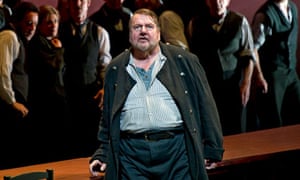Peter Grimes - review
Royal Opera House, London
First seen in Brussels in 1994, and taken into the Royal Opera's repertory a decade later, Willy Decker's production of Peter Grimes is an expressionist take on Britten's first great examination of the relationship between the outsider and society. It drains the work of overt Englishness and aspires to something more self-consciously universal, which tips detailed social realism into a semi-abstract world of slanted planes and chiaroscuro lighting.
The production is at its best in evoking the mass hysteria attendant in puritan rigidity and religious fundamentalism. At the beginning of the first act, the inhabitants of the borough sit in rows as if in church, singing the opening chorus from hymn sheets. Later, as they prepare to hunt Grimes down, the dead apprentice's jumper is emotively tied to a processional cross, wielded by the local rector. The central tragedy is as much Ellen's as Grimes's: after his suicide, she finally submits to the normative values of the society that has broken them both.
Yet there are lapses, musically and dramatically. The immediate establishment both of Ben Heppner's Grimes as a psychopath, and the villagers as a lynch mob, sets the emotional tone too high too soon, leaving little space for development. Heppner sounds convincingly neurotic, but is also plagued by intonation problems when singing softly. Amanda Roocroft's wonderfully acted Ellen has comparable moments of stridency above the stave, while Andrew Davis's conducting, though clean and clear, is at times detached. Jonathan Summers, Roderick Williams and Jane Henschel give their all as Balstrode, Ned Keene and Mrs Sedley respectively, but overall this does not rank among the great performances of the work.

No comments:
Post a Comment